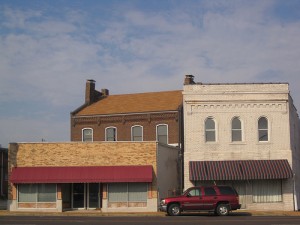 I know when it’s time to give up the game: when you start dreaming about it.
I know when it’s time to give up the game: when you start dreaming about it.
Last night I dreamed that I was telling a group of people the difference between commercial and residential real-estate … the one – key – difference.
Don’t worry, because I’m going to continue blogging about personal finance, but I guess I should at least bring my dream into the the real world by writing about these two classes of real-estate here:
So, what is the difference between the two? That one, key difference?
Is it price? Is it purpose (you can live in one, work in the other)? Something else?
I think it’s all of those things, and more, but I think one reason stands out:

This is residential real-estate, these two houses [pictured above] are the same in every respect:
They look the same; they cost about the same; they will provide a similar standard of living … and, they will produce roughly the same investment return over time.

This is commercial real-estate, these two properties [pictured above] are the same in one very important respect, yet:
They don’t look the same; they didn’t even cost the same; they are totally different types of properties (one is an office, the other a small showroom and warehouse) …
… but, here’s the one thing that makes them identical, at least to an investor:
They will produce roughly the same investment return over time.
You see, residential real-estate is bought/sold/valued on the basis of its utility as a home, not an investment. So, while you can choose to live in it or rent it out as an investment … ultimately, it’s all about its desirability as a future home, street, neighborhood.
Residential real-estate is roughly valued by comparison to others like it, and is ultimately favored by investors for its future value …
… even though residential real-estate is considered a ‘safe, easy’ investment, it’s a sham ; a false promise based on comfort: we all know and understand (to a greater/lesser extent) the value of residential real-estate, because we live in it. Or, if not in ‘it’ in something very much like it, probably even in a neighborhood very much like it.
But, this is false and residential real-estate is actually the most dangerous form of real-estate investment because is is largely speculation; most of the return from residential real-estate is based on capital appreciation.
[AJC: there are exceptions, of course: defence housing, rural areas, and so on … generally, though, you are trading future appreciation for lower rents now. Cashflow positive real-estate does exist, it’s just than most people don’t know how and where to find it]
Commercial real-estate has the reputation of being difficult. Of course, it’s not: you purchase a property, you find a property manager, you rent it out, you collect the rents … nothing could be easier.
And, you are rewarded in the short-term: commercial real-estate is mostly about the income that you can derive from the property. It’s current and future value are simply a multiple of that return [the capitalization rate].
The returns are usually higher, per dollar invested, than residential real-estate (although, the banks will lend less against it); capital appreciation more certain; and, it’s easier to manage (tenants generally don’t trash the place; they pay most of the outgoings; they shoulder the lion’s share of the maintenance burden on the property).
Since most people are too scared to invest in commercial (so, they fight each other – in most ‘normal’ markets – to invest in residential real-estate) overall returns, in my experience, are generally much better.
What do you think they key difference is?







